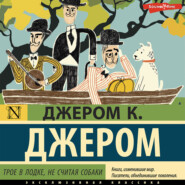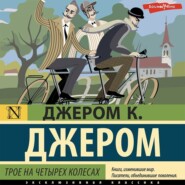По всем вопросам обращайтесь на: info@litportal.ru
(©) 2003-2024.
✖
The Second Thoughts of an Idle Fellow
Настройки чтения
Размер шрифта
Высота строк
Поля
A spoon to stir your tea, I fear you must dispense with. Knives and forks you will discover in plenty; blacking brushes you will put your hand upon in every drawer; of emery paper, did one require it, there are reams; but it is a point with every housekeeper that the spoons be hidden in a different place each night. If anybody excepting herself can find them in the morning, it is a slur upon her. No matter, a stick of firewood, sharpened at one end, makes an excellent substitute.
Your breakfast done, turn out the gas, remount the stairs quietly, open gently the front door and slip out. You will find yourself in an unknown land. A strange city grown round you in the night.
The sweet long streets lie silent in sunlight. Not a living thing is to be seen save some lean Tom that slinks from his gutter feast as you approach. From some tree there will sound perhaps a fretful chirp: but the London sparrow is no early riser; he is but talking in his sleep. The slow tramp of unseen policeman draws near or dies away. The clatter of your own footsteps goes with you, troubling you. You find yourself trying to walk softly, as one does in echoing cathedrals. A voice is everywhere about you whispering to you “Hush.” Is this million-breasted City then some tender Artemis, seeking to keep her babes asleep? “Hush, you careless wayfarer; do not waken them. Walk lighter; they are so tired, these myriad children of mine, sleeping in my thousand arms. They are over-worked and over-worried; so many of them are sick, so many fretful, many of them, alas, so full of naughtiness. But all of them so tired. Hush! they worry me with their noise and riot when they are awake. They are so good now they are asleep. Walk lightly, let them rest.”
Where the ebbing tide flows softly through worn arches to the sea, you may hear the stone-faced City talking to the restless waters: “Why will you never stay with me? Why come but to go?”
“I cannot say, I do not understand. From the deep sea I come, but only as a bird loosed from a child’s hand with a cord. When she calls I must return.”
“It is so with these children of mine. They come to me, I know not whence. I nurse them for a little while, till a hand I do not see plucks them back. And others take their place.”
Through the still air there passes a ripple of sound. The sleeping City stirs with a faint sigh. A distant milk-cart rattling by raises a thousand echoes; it is the vanguard of a yoked army. Soon from every street there rises the soothing cry, “Mee’hilk – mee’hilk.”
London like some Gargantuan babe, is awake, crying for its milk. These be the white-smocked nurses hastening with its morning nourishment. The early church bells ring. “You have had your milk, little London. Now come and say your prayers. Another week has just begun, baby London. God knows what will happen, say your prayers.”
One by one the little creatures creep from behind the blinds into the streets. The brooding tenderness is vanished from the City’s face. The fretful noises of the day have come again. Silence, her lover of the night, kisses her stone lips, and steals away. And you, gentle Reader, return home, garlanded with the self-sufficiency of the early riser.
But it was of a certain week-day morning, in the Strand that I was thinking. I was standing outside Gatti’s Restaurant, where I had just breakfasted, listening leisurely to an argument between an indignant lady passenger, presumably of Irish extraction, and an omnibus conductor.
“For what d’ye want thin to paint Putney on ye’r bus, if ye don’t go to Putney?” said the lady.
“We do go to Putney,” said the conductor.
“Thin why did ye put me out here?”
“I didn’t put you out, yer got out.”
“Shure, didn’t the gintleman in the corner tell me I was comin’ further away from Putney ivery minit?”
“Wal, and so yer was.”
“Thin whoy didn’t you tell me?”
“How was I to know yer wanted to go to Putney? Yer sings out Putney, and I stops and in yer jumps.”
“And for what d’ye think I called out Putney thin?”
“’Cause it’s my name, or rayther the bus’s name. This ’ere is a Putney.”
“How can it be a Putney whin it isn’t goin’ to Putney, ye gomerhawk?”
“Ain’t you an Hirishwoman?” retorted the conductor. “Course yer are. But yer aren’t always goin’ to Ireland. We’re goin’ to Putney in time, only we’re a-going to Liverpool Street fust. ’Igher up, Jim.”
The bus moved on, and I was about cross the road, when a man, muttering savagely to himself, walked into me. He would have swept past me had I not, recognizing him, arrested him. It was my friend B – , a busy editor of magazines and journals. It was some seconds before he appeared able to struggle out of his abstraction, and remember himself. “Halloo,” he then said, “who would have thought of seeing you here?”
“To judge by the way you were walking,” I replied, “one would imagine the Strand the last place in which you expected to see any human being. Do you ever walk into a short-tempered, muscular man?”
“Did I walk into you?” he asked surprised.
“Well, not right in,” I answered, “I if we are to be literal. You walked on to me; if I had not stopped you, I suppose you would have walked over me.”
“It is this confounded Christmas business,” he explained. “It drives me off my head.”
“I have heard Christmas advanced as an excuse for many things,” I replied, “but not early in September.”
“Oh, you know what I mean,” he answered, “we are in the middle of our Christmas number. I am working day and night upon it. By the bye,” he added, “that puts me in mind. I am arranging a symposium, and I want you to join. ‘Should Christmas,’” – I interrupted him.
“My dear fellow,” I said, “I commenced my journalistic career when I was eighteen, and I have continued it at intervals ever since. I have written about Christmas from the sentimental point of view; I have analyzed it from the philosophical point of view; and I have scarified it from the sarcastic standpoint. I have treated Christmas humorously for the Comics, and sympathetically for the Provincial Weeklies. I have said all that is worth saying on the subject of Christmas – maybe a trifle more. I have told the new-fashioned Christmas story – you know the sort of thing: your heroine tries to understand herself, and, failing, runs off with the man who began as the hero; your good woman turns out to be really bad when one comes to know her; while the villain, the only decent person in the story, dies with an enigmatic sentence on his lips that looks as if it meant something, but which you yourself would be sorry to have to explain. I have also written the old-fashioned Christmas story – you know that also: you begin with a good old-fashioned snowstorm; you have a good old-fashioned squire, and he lives in a good old-fashioned Hall; you work in a good old-fashioned murder; and end up with a good old-fashioned Christmas dinner. I have gathered Christmas guests together round the crackling logs to tell ghost stories to each other on Christmas Eve, while without the wind howled, as it always does on these occasions, at its proper cue. I have sent children to Heaven on Christmas Eve – it must be quite a busy time for St. Peter, Christmas morning, so many good children die on Christmas Eve. It has always been a popular night with them. – I have revivified dead lovers and brought them back well and jolly, just in time to sit down to the Christmas dinner. I am not ashamed of having done these things. At the time I thought them good. I once loved currant wine and girls with towzley hair. One’s views change as one grows older. I have discussed Christmas as a religious festival. I have arraigned it as a social incubus. If there be any joke connected with Christmas that I have not already made I should be glad to hear it. I have trotted out the indigestion jokes till the sight of one of them gives me indigestion myself. I have ridiculed the family gathering. I have scoffed at the Christmas present. I have made witty use of paterfamilias and his bills. I have – ”
“Did I ever show you,” I broke off to ask as we were crossing the Haymarket, “that little parody of mine on Poe’s poem of ‘The Bells’? It begins – ” He interrupted me in his turn —
“Bills, bills, bills,” he repeated.
“You are quite right,” I admitted. “I forgot I ever showed it to you.”
“You never did,” he replied.
“Then how do you know how it begins?” I asked.
“I don’t know for certain,” he admitted, “but I get, on an average, sixty-five a year submitted to me, and they all begin that way. I thought, perhaps, yours did also.”
“I don’t see how else it could begin,” I retorted. He had rather annoyed me. “Besides, it doesn’t matter how a poem begins, it is how it goes on that is the important thing and anyhow, I’m not going to write you anything about Christmas. Ask me to make you a new joke about a plumber; suggest my inventing something original and not too shocking for a child to say about heaven; propose my running you off a dog story that can be believed by a man of average determination and we may come to terms. But on the subject of Christmas I am taking a rest.”
By this time we had reached Piccadilly Circus.
“I don’t blame you,” he said, “if you are as sick of the subject as I am. So soon as these Christmas numbers are off my mind, and Christmas is over till next June at the office, I shall begin it at home. The housekeeping is gone up a pound a week already. I know what that means. The dear little woman is saving up to give me an expensive present that I don’t want. I think the presents are the worst part of Christmas. Emma will give me a water-colour that she has painted herself. She always does. There would be no harm in that if she did not expect me to hang it in the drawing room. Have you ever seen my cousin Emma’s water-colours?” he asked.
“I think I have,” I replied.
“There’s no thinking about it,” he retorted angrily. “They’re not the sort of water-colours you forget.”
He apostrophized the Circus generally.
“Why do people do these things?” he demanded. “Even an amateur artist must have some sense. Can’t they see what is happening? There’s that thing of hers hanging in the passage. I put it in the passage because there’s not much light in the passage. She’s labelled it Reverie. If she had called it Influenza I could have understood it. I asked her where she got the idea from, and she said she saw the sky like that one evening in Norfolk. Great Heavens! then why didn’t she shut her eyes or go home and hide behind the bed-curtains? If I had seen a sky like that in Norfolk I should have taken the first train back to London. I suppose the poor girl can’t help seeing these things, but why paint them?”
I said, “I suppose painting is a necessity to some natures.”
“But why give the things to me?” he pleaded.
I could offer him no adequate reason.
“The idiotic presents that people give you!” he continued. “I said I’d like Tennyson’s poems one year. They had worried me to know what I did want. I didn’t want anything really; that was the only thing I could think of that I wasn’t dead sure I didn’t want. Well, they clubbed together, four of them, and gave me Tennyson in twelve volumes, illustrated with coloured photographs. They meant kindly, of course. If you suggest a tobacco-pouch they give you a blue velvet bag capable of holding about a pound, embroidered with flowers, life-size. The only way one could use it would be to put a strap to it and wear it as a satchel. Would you believe it, I have got a velvet smoking-jacket, ornamented with forget-me-nots and butterflies in coloured silk; I’m not joking. And they ask me why I never wear it. I’ll bring it down to the Club one of these nights and wake the place up a bit: it needs it.”
We had arrived by this at the steps of the ‘Devonshire.’
“And I’m just as bad,” he went on, “when I give presents. I never give them what they want. I never hit upon anything that is of any use to anybody. If I give Jane a chinchilla tippet, you may be certain chinchilla is the most out-of-date fur that any woman could wear. ‘Oh! that is nice of you,’ she says; ‘now that is just the very thing I wanted. I will keep it by me till chinchilla comes in again.’ I give the girls watch-chains when nobody is wearing watch-chains. When watch-chains are all the rage I give them ear-rings, and they thank me, and suggest my taking them to a fancy-dress ball, that being their only chance to wear the confounded things. I waste money on white gloves with black backs, to find that white gloves with black backs stamp a woman as suburban. I believe all the shop-keepers in London save their old stock to palm it off on me at Christmas time. And why does it always take half-a-dozen people to serve you with a pair of gloves, I’d like to know? Only last week Jane asked me to get her some gloves for that last Mansion House affair. I was feeling amiable, and I thought I would do the thing handsomely. I hate going into a draper’s shop; everybody stares at a man as if he were forcing his way into the ladies’ department of a Turkish bath. One of those marionette sort of men came up to me and said it was a fine morning. What the devil did I want to talk about the morning to him for? I said I wanted some gloves. I described them to the best of my recollection. I said, ‘I want them four buttons, but they are not to be button-gloves; the buttons are in the middle and they reach up to the elbow, if you know what I mean.’ He bowed, and said he understood exactly what I meant, which was a damned sight more than I did. I told him I wanted three pair cream and three pair fawn-coloured, and the fawn-coloured were to be swedes. He corrected me. He said I meant ‘Suede.’ I dare say he was right, but the interruption put me off, and I had to begin over again. He listened attentively until I had finished. I guess I was about five minutes standing with him there close to the door. He said, ‘Is that all you require, sir, this morning?’ I said it was.
“‘Thank you, sir,’ he replied. ‘This way, please, sir.’

















